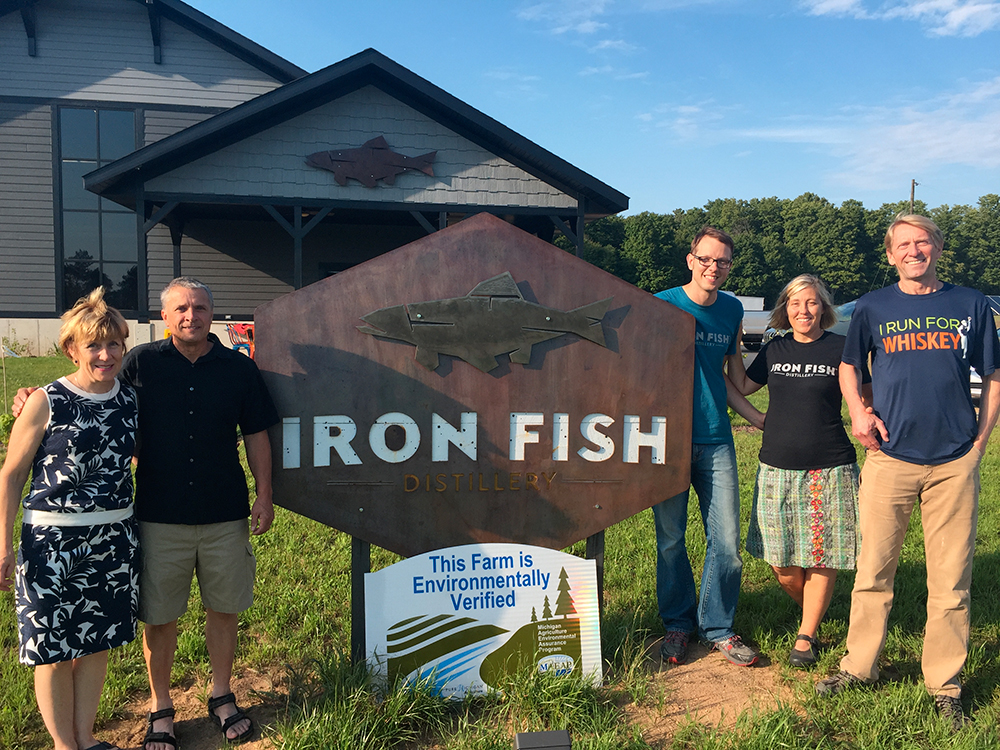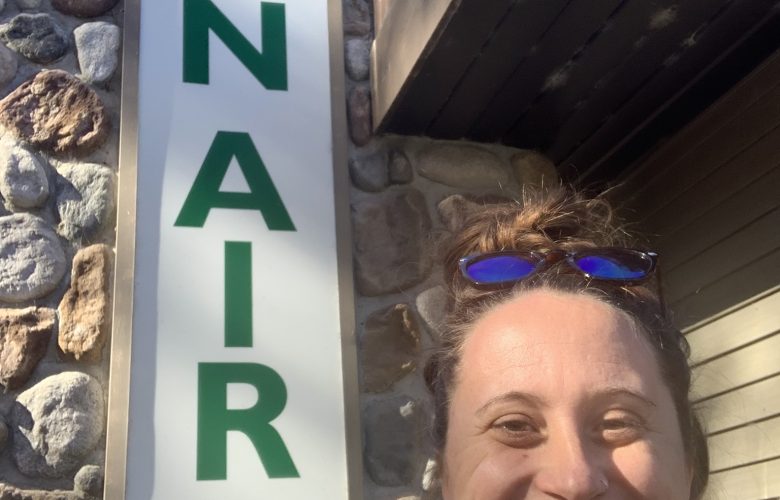Michigan’s first farm-based distillery opens near Thompsonville
By Jacob Wheeler
Current Editor
“Retirement” is a strange proposition. Some Baby Boomers waltz into the sunset, sleep late, and catch up on their bedside books. Others grow restless and launch new ventures.
When Richard Anderson turned 60 in the spring of 2014, his wife, Sarah, sent him on a scotch tour of Scotland along with her brothers-in-law, David Wallace and Craig Maxwell. They were touring several 300-year-old, farm-based distilleries on the island of Islay—famous for its “whiskey tourism”—when the taste of smoky peat infected the men with a novel idea: why not build a spirits distillery on the 119-acre farm that Wallace and his wife, Heidi Bolger, had recently acquired near Thompsonville?
The idea stuck, they gave each other assignments, and, by the time they left Islay, a plan was already fermenting. Anderson and Wallace paid a deposit on high-end, German-made whiskey stills and equipment, and together with their wives, the entrepreneurs set out to build Michigan’s first farm-based distillery.
Less than two and a half years later, Iron Fish Distillery will open over Labor Day weekend on a 119-acre farm on Dzuibanek Road, a dirt thoroughfare that is three miles from Crystal Mountain Resort, five miles from downtown Thompsonville, and just south of the Manistee-Benzie county line. Nearby meanders the tranquil Betsie River. The rural property is so beautiful that you might sip a spirit and stay all afternoon, and it is so remote that you would slip into the 19th century if it were not for the buzzing of the smart phone in your pocket.
“We could have created an urban distillery or a distillery in downtown Frankfort,” Richard Anderson says. “But we thought it would be more fascinating to do it from scratch. This is the way it used to be done. Distilling was a farm trade. The consequence of that decision is that we are Michigan’s first farm-based distillery.”
Poetic Launch
Richard, Sarah, David, and Heidi broke ground with the distillery last September 21, which means the construction project was ready in less than 12 months, a lightning pace. Their new friend Michael Delp—poet, former professor at Interlochen Arts Academy, avid fisherman, and whiskey connoisseur—read his poem “Steelhead Dreams” at the groundbreaking. Delp’s lyrical words, and his own lifelong fight to swim against the current (notably not The Current), seemed appropriate, given the distillery’s name of Iron Fish. How did the name come about?
“It was hard to find a name for the business that we could trademark,” Wallace explains. “At some point, we settled on the name of a fish. The iron fish is a steelhead salmon that runs up the Betsie River.”
Wallace also fancied the name, because his hobby is metal artwork—the metal fish logo behind the bar at the distillery is his creation.
“You could actually substitute ‘whiskey’ for ‘steelhead’ in terms of the spirit and nature of the fish,” Wallace goes on. “Catching a steelhead is the epitome of catching a fish. They are prehistoric and beautiful.” Like fine, aged scotch.
There is another parallel between the iron fish steelhead and the founders of the distillery: sisters Sarah Anderson and Heidi Bolger spent summers in Benzie County visiting their aunt Beulah, who was a fixture in the community. Beulah boasted a deep history here; she was involved in founding the Animal Welfare League of Benzie County, and she ran the Benzie County Chamber of Commerce for a time, in addition to working for the Ann Arbor Railroad for decades.
Like steelhead salmon swimming back upstream to their native waters to reproduce, the sisters returned home to Benzie County to launch the distillery with their husbands.
Local Connection
All fall and winter, hunters, horseback riders, and snowmobilers would come down Dzuibanek Road to visit the distillery-in-progress and inquire what was happening at this 19th-century farmstead where the Chamberlain family had once lived.
According to Richard Anderson, George Chamberlain purchased the land from the state in the late 1880s and passed it on to his son, Victor, who lived there with his wife, Martha, until they died in the early 1990s. The farm was subsequently abandoned, and the fields went fallow. Victor’s nieces sold the farm to David Wallace and Heidi Bolger five years ago.
“The people who have stopped here to visit us all have a story to tell,” Richard says. “They are rooted here. They all knew the Chamberlains. We hope to build a connection with them and become their distillery.”
One such story came on a snowy day early this year, when a Benzie County Road Commission snowplow driver stopped by and told Richard that he had once been the caretaker of the farm. This meant that he had fought to keep vandals and squatters out of the old farmhouse, which had sat empty for 20 years. The driver pointed to a small barn, which was stuffed with hay, and asked Richard, “Did you know that Victor kept an illegal still during and just after Prohibition. Look around. You might find it in the attic.”
The still could not be found (it may have been used for scrap metal), but the new owners did find Victor’s old wooden hammermill, which he used to grind flour and make spirits. The owners plan to restore the artifact and run grain through it—an homage to Victor Chamberlain.
Another day brought a visit from a regulator with the Michigan Liquor Control Commission, a regulator whose grandfather had been the sheriff of a neighboring county and thus was tasked with confiscating illegal stills from area farms.
Salt-of-the-earth locals and Crystal Mountain homeowners, too, have been curious about the upscale new distillery. Last October 17, during halftime of the historic Michigan vs. Michigan State gridiron match—the one that ended with a Wolverine fumble giving the Spartans a desperate, last-second, 27-23 victory—a team of hunters wearing green camouflage piled out of a four-door pickup with a Michigan State license tag to see what was being built. One of them asked Richard if Iron Fish Distillery would have a television.
“Hell ya!” said Richard, an MSU graduate, himself. “If you do,” the hunter responded, “we Spartan fans will fill this place up.”
Distillery tasting rooms—particularly those in Scotland—typically do not have a TV.
“But that connection with the community is important for us,” Richard. says “We’ll even accept some U of M folks in here.” (This journalist and Michigan alum breathes a sigh of relief.)
“The whole idea of this is an agricultural destination for all,” he adds.
Richard’s wife, Sarah, chimes in with a laugh: “We’ll have bike parking, car parking, tractor parking, snowmobile parking, even horse parking here.”
Deep-Water Source
Iron Fish’s distiller is Dan Krolczyk, a winemaker, brewer, and distiller who has logged thousands of hours of spirit-making. Krolczyk, whose family owns a farm in Mason County, has a winemaking certificate from the University of California Davis, has made wines for six years for L. Mawby Winery near Suttons Bay, and has worked for both North Peak Brewing Company and Grand Traverse Distillery in Traverse City. He has lived in Northern Michigan since 2004.
“When you are distilling, you’re making a beer but not the way you’d want it to taste if you were going to go sit at a bar,” Krolczyk explains above the rhythmic sound of more grain being pumped into the tanks.
The Iron Fish process goes something like this: take grain from the property, add it to water that is also from the property, heat it up, then cool it down, convert the starches from the grain to sugar, and put it in the fermenter, then the whole mash in the still. Then go through the process of removing the water that you added in the first place. (It is ironic, because you had this big batch and then, at the end, you come out with a small amount of high-proof alcohol, to which you ultimately add water again.)
Steelhead Dreams
Tonight, just before I fall asleep, I hear the wind kick up in the red pines outside the house. I begin to go under, begin to submerge myself in a dream I know is waiting for me. “The steelhead run with the wind,” I remember someone saying. And I think of thousands of fish gathering at the mouths of rivers up and down Lake Michigan. I begin to think of my bed and how I lie on top of it as some way I am able to hover just over the dream. As if the dream itself were made of water and I could lower myself down into a river choked with March ice. Holding. Just off a river mouth.
I listen. Underwater the wind sounds like thousands of waterfalls. A dull roar. A roar coming from far off and seeping gradually into my head. There are hundreds of fish waiting. They fan slowly, move up and down, some sideways in the current coming out of the river.
If I listen clearly enough to the inside of my head, I can hear the sound of some old command, some old memory let loose far upstream calling me in.
The water turns chemical. Chemicals loose in the tiny brains of these fish washing through their bodies, urging them up river.
They surge through deadfall, upstream, rounding bends deep underwater, the sound of the river mixing with the sound of wind. All chemical. Something drifting now in their bodies. Bodies that look like pure aluminum muscles loose in the water.
The water that Iron Fish Distillery uses is from an aquifer that connects to the nearby Betsie River. Richard believes this is also Michigan’s first distillery to use a deep-water well.
Krolczyk recycles the water that he uses from batch to batch of spirit production, and the Iron Fish team does not believe that their production has a substantial impact on the water table and aquifer near the farm. Nevertheless, they are in the process of gathering exact data to measure their water footprint, which the owners feel that people have a right to see and understand.
Moreover, the farm aspect of the business—which is run by farm manager Dylan McGee—is a Michigan Environmentally Assured Farm, meaning that they “keep their land, water, and air as healthy as the food they produce, [representing] the highest quality of environmental stewardship and the pinnacle of responsible agriculture.” Michigan Agriculture Environmental Assurance Program (MAEAP) farms are required to go through a rigorous review by the Michigan Department of Agriculture and Rural Development every three years to ensure that they are in compliance.
The farm harvested its first crop of wheat on July 26, thanks in large part to a neighbor with “some ginormous, super techie equipment.” (The wheat will later be used to make vodka and whiskey.)
“The highlight of working here is that the owners and staff are such an eclectic group,” Krolczyk says. “Everyone brings different skills and personalities, and everyone feeds off one another. It’s knowing you’re working with a fantastic team, and—in the end—there will be a fantastic, locally made product.”
On Labor Day weekend, Iron Fish Distillery will open with its own rum. Shortly thereafter, they will serve vodka and short-order gin that includes botanicals harvested from the Betsie River region. Krolczyk plans to begin making his whiskeys this fall, and the distillery should have them ready 18 months later.
Whenever possible, Michigan products are used in the spirits. The wheat in the current vodka batch is from the Send Brothers Farm in Williamsburg. The molasses is also from the mitten state. Iron Fish plans to buy all herbs, fruits, and vegetables from local farms, such as Ware Farm of Bear Lake and King Orchards of Central Lake. They even hope to make applejack from local ingredients.
Iron Fish also plans to partner with other regional farms on pristine riversheds, such as one in the Upper Peninsula that will deliver 6,000 pounds of rye in return for a whiskey that Krolczyk plans to make which will be called Chocolay River Rye.
“We’re super focused on partnerships with farms that are environmentally managed to protect watersheds,” Richard says.
It seems fitting that this distillery’s mission is so focused on water, given its namesake.
Outdoor Seating and Weddings
The 119-acre property is home to an old barn and a new 4,900-square-foot building, including more than 25 major pieces of equipment.
The byproduct of ethanol produced to make spirits is methanol, which Iron Fish will use to fuel heat lamps so that customers can sit outdoors for all 12 months of the year. The tasting room can accommodate approximately 50 people, but another 120 can sip spirits outside, while sitting by a fire pit. The distillery hopes to remain open seven days a week throughout most of the year.
Iron Fish will also host weddings, family reunions, and other events. The nearby barn can be rented for special occasions, even as the distillery tasting room remains open to the public.
The four entrepreneurs hope to sell their spirits to wholesale customers far and wide. But the tasting room is important, too.
“We want to make an impression at this location,” Sarah Anderson says. “We want people to experience our product in this beautiful setting.”
Iron Fish Distillery is located at 14234 Dzuibanek Road, which is five miles southwest of downtown Thompsonville. Call them at 231-378-3474, or find them on the web at IronFishDistillery.com.




